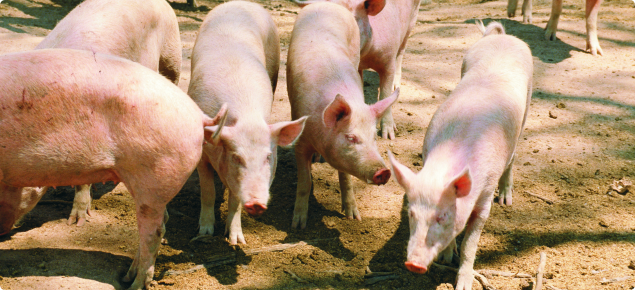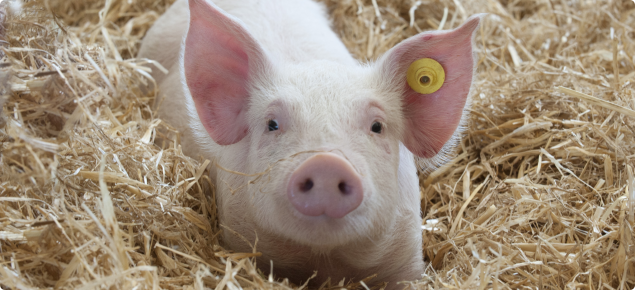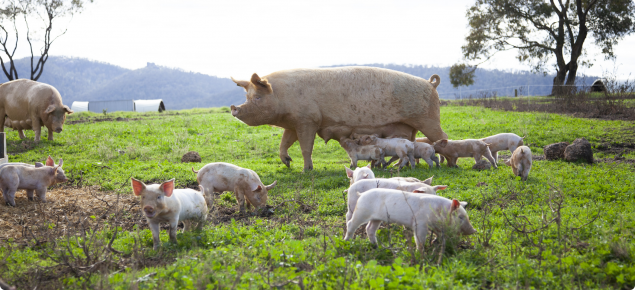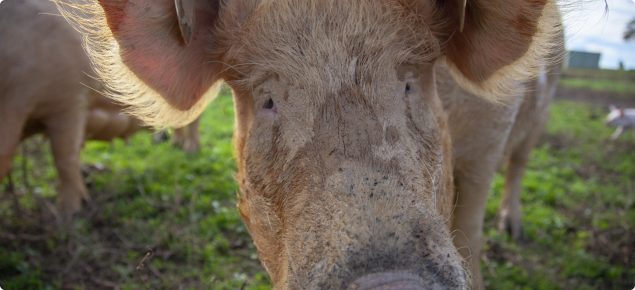Biosecurity is a range of practices that aim to keep disease out of your property. This checklist summarises the actions you can take to protect your pigs and the WA pig industry from the devastating effects of emergency diseases and to minimise the spread of more common diseases.
Assess your property against each section to ensure your biosecurity is adequate.
Healthy pigs
Healthy pigs are intelligent, social, alert animals. They forage in the ground for food, and eat and sleep frequently throughout the day.
- Heart rate: 70–120 beats per minute
- Breathing: 10–20 breaths per minute
- Temperature: 38.5-39.5°C
Sick pigs may:
- lose their appetite
- separate from other pigs
- become listless
- have a swollen navel, udder or joints
- have rapid or irregular breathing, sneeze
- persistently cough or pant
- shiver
- have discoloured or blistered skin
- lose body condition
- become lame
- lose co-ordination.
If you see unusual illness or behaviour or unexpected deaths in pigs, call your vet immediately or the Emergency Animal Disease (EAD) hotline on 1800 675 888.
Before you buy pigs
- Check whether your local council has any restrictions on owning pigs.
- Register as an owner of livestock with the Department of Primary Industries and Regional Development (DPIRD). You will be allocated a property identification code (PIC), a livestock brand and a pig brand.
- Order a PigPass national vendor declaration (NVD) waybill book (pigpass.com.au or 1800 001 458) as this is required to move pigs off your property.
- Ensure you have appropriate fencing that will prevent pigs straying.
- If you work in a piggery/poultry premise, you should not keep pigs at home.
Buying a pig
- Anyone who sells you a pig must provide a PigPass NVD waybill so you can transport the pig. You will need to provide them with your PIC.
- If buying a pig, obtain details of its health status: vaccinations, worm and external parasite treatments and other medications.
- Your pig should come with a National Livestock Identification System (NLIS) pig ear tag (any size pig) with the PIC of the seller, or their pig brand (pigs over 25kg only) tattooed on their shoulder.
- Isolate new arrivals for at least seven days. Attend to new arrivals last and use separate equipment.
- Record the movement of the pig onto your property on the PigPass database.
Biosecurity on property
- Develop and follow a herd health program, including vaccinations, parasite treatments and suitable diet.
- Do not feed food scraps or other swill (prohibited pig feed) to pigs. See the ‘Feeding pigs’ heading below for more information on safe feed.
- Securely fence farm dumps to exclude feral pigs from accessing food waste.
- Ensure feral pigs cannot access domestic pigs or pig facilities through appropriate segregation and fencing.
- Report unusual illnesses to a vet or the EAD hotline on 1800 675 888.
- Only use veterinary medicines prescribed by a vet for your pigs.
- Follow all label instructions including dose rate, withholding periods and export slaughter intervals for any medicines/chemicals used on your pigs.
- Visitors should wear clean boots and clothes before they come into contact with your pigs. Overseas visitors or returning workers should not have contact with pigs for seven days after entering Australia.
Managing pig health
- Inspect your pigs at least once a day.
- Separate sick pigs from healthy animals.
- Consult a vet about any unusual illness or unexpected deaths.
- Vaccinate for common diseases.
- Keep a record of veterinary treatments.
- Provide access to weatherproof shelter.
- If kept in paddocks, rotate your pigs onto fresh pasture (before 60% grazed).
- Regularly clean pig pens and/or remove manure from paddocks.
- Train staff to follow biosecurity practices for disease prevention and identification.
Moving pigs onto/off your property
- Check the health of your pigs before transporting them off the property.
- Do not move sick animals to a show/gathering or another property.
- Keep records of pig movements onto and off your property by keeping the waybills from those movements for the required seven years.
- Complete a PigPass NVD waybill before moving pigs off a property. Legally identify (brand or eartag) pigs leaving the property for sale or slaughter. The new owner must provide you with their PIC.
- Identify your pigs with an NLIS pig ear tag (any size pigs) or your pig brand tattoo (pigs over 25kg).
- If you bred the pig, use a yellow tag in their left ear, or tattoo their left shoulder.
- If you did not breed the pig, use an orange tag in the pig’s right ear or tattoo their right shoulder.
- Clean and disinfect vehicles/equipment before leaving/returning to your property.
- Clean all clothing before leaving and returning to the property.
- Check the health of your pigs before returning home after an event.
- Isolate and observe pigs returning from shows/gatherings for seven days. Call a vet if you see any signs of illness.
Feeding pigs
It is illegal in Australia to feed pigs food or food scraps that contain meat or that have had contact with meat (also known as swill or prohibited pig feed).
This is because swill can cause severe diseases in pigs, which can spread to other livestock. Feeding swill is thought to have caused the devastating outbreak of foot-and-mouth disease in the United Kingdom in 2001. African swine fever can also be caused by swill feeding.
Which foods (swill) are illegal to feed to pigs?
- all meat, meat scraps, meat trimmings
- offal (liver, kidney, brains, tongue, intestines)
- blood, bones and animal carcasses
- material containing meat/meat products
- any waste not known to be free of meat or contact with meat
- food scraps and waste from:
- processors and manufacturers
- food retailers (e.g. bakeries, supermarkets)
- hotels, restaurants, cafés, fast food outlets, delicatessens, lunch bars, canteens
- homes/kitchen scraps
- rubbish dumps.
Pig owners must also prevent pigs from accessing swill (e.g. via unfenced dumps or compost heaps).
Which foods are safe to feed pigs?
- commercially prepared pig feeds
- rendered meat meals that meet Australian standards (often present in commercial pig feed)
- gelatine, milk and milk products
- grains, fruits and vegetables (free of contact with meat)
- hay and straw.
For more information about safe feed for pigs, see the pig feed webpage. For more information about pig biosecurity, contact your local DPIRD vet.




